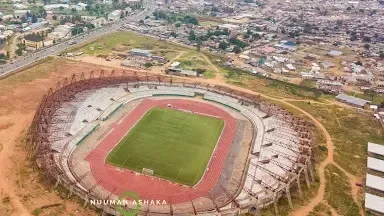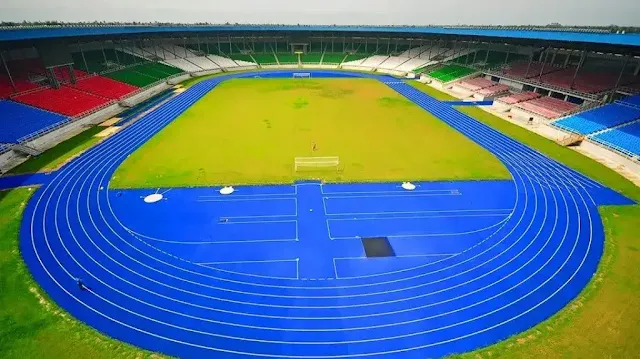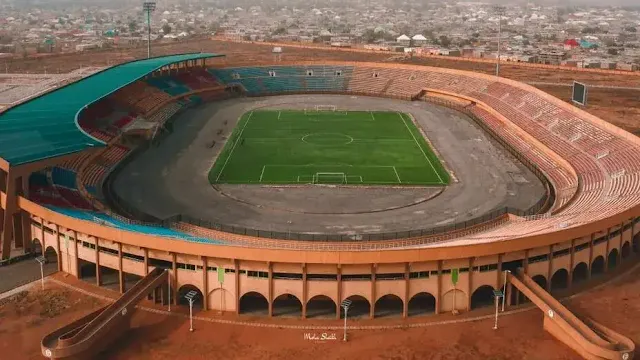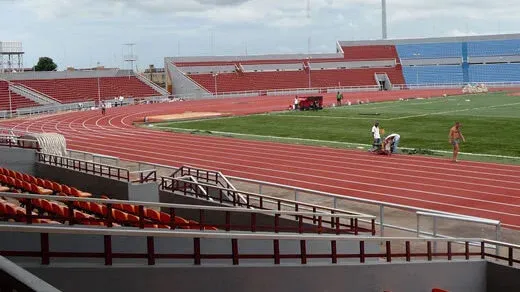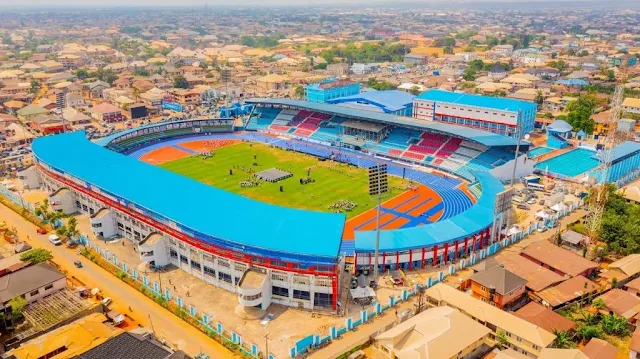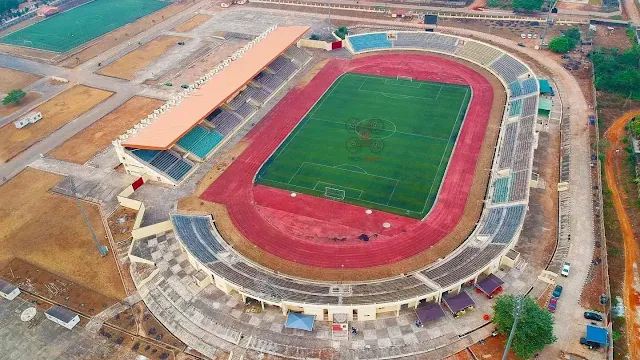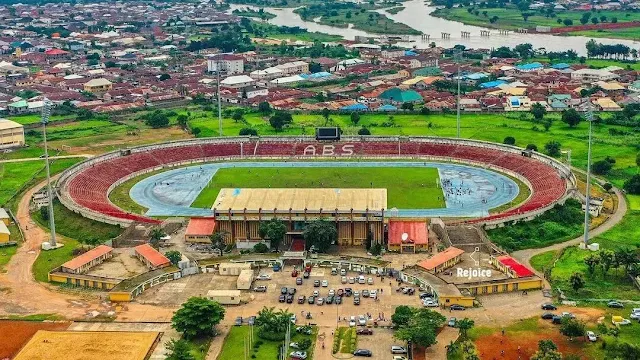Nestled within the vibrant landscapes of Nigeria, where passion and exuberance run deep, stand the majestic coliseums that epitomize the nation's unwavering love affair with sports. These sprawling arenas, the largest stadiums in Nigeria, embody a palpable energy that ignites the hearts of millions. With architectural grandeur that commands attention, they serve as epicenters where dreams are forged, heroes are celebrated, and the spirit of competition thrives. From the rhythmic chants reverberating through the awe-inspiring walls of the National Stadium in Lagos to the thunderous applause that resonates within the colossal edifice of Godswill Akpabio International Stadium in Uyo, these mammoth structures stand as testament to Nigeria's indomitable spirit and unwavering dedication to the beautiful game. Within their hallowed confines, history is etched, legends are born, and a nation unites in a symphony of unwavering support, creating an everlasting legacy that resonates across the nation's vibrant tapestry.
1. Moshood Abiola National Stadium - Capacity 60,491
The Moshood Abiola National Stadium, formerly known as the National Stadium, Lagos, is a prominent multi-purpose sports complex located in Surulere, Lagos, Nigeria. It was renamed in honor of Moshood Kashimawo Olawale Abiola, a Nigerian businessman and politician who played a significant role in the country's democratic struggle. The stadium was originally constructed in 1972 and has since undergone several renovations to meet international standards.
Spanning across an expansive area, the stadium boasts a seating capacity of about 60,000 spectators, making it one of the largest sports arenas in Africa. It has hosted numerous sporting events of national and international significance, including football matches, athletics competitions, and cultural festivals. The stadium's football field has seen iconic moments, serving as the home ground for several Nigerian football clubs and the national football team, the Super Eagles.
2. Jos International Stadium - Capacity 60,000
The Jos International Stadium, located in the city of Jos, Plateau State, Nigeria, is a prominent sports facility that serves as a hub for various athletic events and competitions. It is a significant venue for football matches, athletics championships, and other sporting activities.
The Jos International Stadium has hosted numerous local and international football matches, attracting passionate fans from across the region. It serves as the home ground for popular Nigerian football clubs, including Plateau United Football Club. The stadium has witnessed intense rivalries, thrilling goals, and memorable moments, contributing to the growth and development of football in the region.
3. Lagos National Stadium - Capacity 45,000
The National Stadium, Lagos, also known as the National Stadium Surulere, is a significant sports complex located in Surulere, Lagos, Nigeria. It is one of the most prominent stadiums in the country and has played a vital role in Nigeria's sporting history.
The National Stadium, Lagos was constructed in 1972 to host the 2nd All-Africa Games. It has a capacity of approximately 45,000 spectators, making it one of the largest stadiums in Nigeria. The stadium was designed with a bowl-like structure, providing excellent sightlines and a vibrant atmosphere for sporting events.
4. Adokiye Amiesimaka Stadium - Capacity 38,000
The Adokiye Amiesimaka Stadium, also known as the Amiesimaka Stadium, is a multi-purpose sports facility located in Port Harcourt, Rivers State, Nigeria. Named after Adokiye Amiesimaka, a former Nigerian football player, lawyer, and sports administrator, the stadium holds great significance in the region.
The stadium was constructed in 2011 in preparation for the 17th National Sports Festival held in Rivers State. It has a seating capacity of approximately 38,000 spectators and features modern amenities and facilities to cater to various sporting events.
The Adokiye Amiesimaka Stadium has primarily been utilized for football matches, serving as the home ground for Rivers United Football Club, one of the prominent Nigerian football clubs. The stadium has witnessed thrilling matches, passionate fans, and remarkable sporting moments, contributing to the growth of football in the region.
5. Muhammadu Dikko Stadium - Capacity 35,000
The Muhammadu Dikko Stadium, located in Katsina, Nigeria, is a notable sports facility named after Muhammadu Dikko, a prominent Nigerian businessman and football administrator. The stadium serves as a hub for various sporting activities and events in the region.
The stadium was constructed to international standards and has a seating capacity of approximately 35,000 spectators. It primarily hosts football matches and has been the home ground for Katsina United Football Club, a team competing in the Nigerian Professional Football League.
6. Godswill Akpabio International Stadium - Capacity 30.000
The Godswill Akpabio International Stadium, also known as the Akwa Ibom International Stadium, is a world-class sports complex located in Uyo, Akwa Ibom State, Nigeria. The stadium is named after Godswill Akpabio, the former governor of Akwa Ibom State, who played a crucial role in its construction.
The stadium was officially opened in 2014 and has a seating capacity of approximately 30,000 spectators, which can be expanded to accommodate up to 60,000 people for special events. Its architectural design showcases a modern and eye-catching structure, equipped with state-of-the-art facilities.
The Godswill Akpabio International Stadium has become a significant venue for both national and international sporting events. It has hosted numerous football matches, including Nigerian league matches, international friendlies, and African Cup of Nations qualifiers. The stadium serves as the home ground for Akwa United Football Club, a prominent Nigerian football team.
7. Obafemi Awolowo Stadium - Capacity 25,000
The Obafemi Awolowo Stadium, also known as Liberty Stadium, is a historic sports complex located in Ibadan, Oyo State, Nigeria. Named after Obafemi Awolowo, a prominent Nigerian nationalist and political leader, the stadium holds great significance in the country's sporting and cultural history.
The stadium was inaugurated in 1960 and was the first stadium to be constructed in Nigeria after the country gained independence. It has a seating capacity of approximately 35,000 spectators and has undergone several renovations to maintain its relevance and functionality.
8. Teslim Balogun Stadium - Capacity 24,325
The Teslim Balogun Stadium, located in Surulere, Lagos, Nigeria, is a well-known sports complex that has played a significant role in Nigeria's sporting history. It is named after Teslim Balogun, a legendary Nigerian footballer who made notable contributions to the sport.
The stadium was originally constructed in 1967 and has undergone several renovations and upgrades since then. It has a seating capacity of approximately 25,000 spectators, making it one of the notable sporting venues in Lagos.
10. Nnamdi Azikiwe Stadium - Capacity 22,000
The Nnamdi Azikiwe Stadium, also known as the Nnamdi Azikiwe Stadium Enugu, is a major sports facility located in Enugu, Nigeria. Named after Nnamdi Azikiwe, the first President of Nigeria, the stadium holds significant historical and cultural value.
The stadium was constructed in 1958 and has since undergone renovations and upgrades. It has a seating capacity of approximately 22,000 spectators, making it a prominent sporting venue in the region.
The Nnamdi Azikiwe Stadium has primarily been used for football matches, serving as the home ground for Enugu Rangers International Football Club, one of the most successful Nigerian football clubs. It has witnessed thrilling encounters, passionate fans, and remarkable sporting moments, contributing to the rich football culture of Enugu and the country as a whole.
11. Stephen Keshi Stadium - Capacity 22,000
The Stephen Keshi Stadium, also known as the Asaba Township Stadium, is a modern sports complex located in Asaba, Delta State, Nigeria. The stadium is named after Stephen Keshi, a legendary Nigerian football player and coach who led the Nigerian national team to win the Africa Cup of Nations in 2013.
The construction of the stadium was completed in 2018 in preparation for the 21st African Senior Athletics Championships held in Asaba. The Stephen Keshi Stadium has a seating capacity of approximately 22,000 spectators and features state-of-the-art facilities and infrastructure.
12. Otunba Dipo Dina International Stadium - Capacity 20,000
The Otunba Dipo Dina International Stadium, also known as Dipo Dina Stadium, is a notable sports facility located in Ijebu-Ode, Ogun State, Nigeria. The stadium is named in honor of Otunba Oladipupo Adebutu Dina, a Nigerian politician and businessman.
The stadium was officially opened in 2010 and has a seating capacity of approximately 20,000 spectators. It serves as a venue for various sporting events, including football matches, athletics competitions, and other sports activities.
13. Warri Township Stadium - Capacity 20,000
The Warri Township Stadium, also known as the Warri City Stadium, is a notable sports complex located in Warri, Delta State, Nigeria. The stadium has played a significant role in the sporting history of the region.
Constructed in 1996, the Warri Township Stadium has a seating capacity of approximately 20,000 spectators. It has been a venue for various sporting events, including football matches, athletics competitions, and cultural activities.
14. Kwara State Stadium - Capacity 18,000
The Kwara State Stadium, also known as the Kwara State Stadium Complex, is a prominent sports facility located in Ilorin, Kwara State, Nigeria. The stadium serves as a hub for various sporting activities and events in the region.
The construction of the Kwara State Stadium was completed in 1976, and it has since undergone renovations and upgrades. It has a seating capacity of approximately 18,000 spectators, making it one of the notable sporting venues in Kwara State.
The stadium has primarily been utilized for football matches, serving as the home ground for Kwara United Football Club, a prominent Nigerian football team.
15. Ahmadu Bello Stadium - Capacity 16,000.
The Ahmadu Bello Stadium, located in Kaduna, Nigeria, is a renowned sports complex named after Sir Ahmadu Bello, the first Premier of the Northern Region of Nigeria. It stands as a significant landmark and a hub for sporting events in the country.
The stadium was officially opened in 1978 and has a seating capacity of approximately 16,000 spectators, although it can accommodate larger crowds for special events. Over the years, it has been recognized as one of Nigeria's most historic and well-equipped stadiums.
The Ahmadu Bello Stadium has primarily been utilized for football matches, hosting both local and national league games, as well as international fixtures. It serves as the home ground for Kaduna United Football Club.
16. Enyimba International Stadium - Capacity 16,000
Enyimba International Stadium, also known as Enyimba Stadium or Enyimba Township Stadium, is a renowned sports complex located in Aba, Abia State, Nigeria. It serves as the home ground for Enyimba International Football Club, one of the most successful Nigerian football teams.
The Enyimba International Stadium was officially opened in 1987 and has a seating capacity of approximately 16,000 spectators. It is widely recognized as one of Nigeria's top football stadiums and has hosted numerous local and international matches.
The stadium has witnessed remarkable moments in Nigerian football history, as Enyimba International Football Club has achieved considerable success, winning several Nigerian Professional Football League titles and continental championships, including the CAF Champions League.
17. Liberation Stadium - Capacity 16,000
Liberation Stadium, also known as Yakubu Gowon Stadium, is a significant sports complex located in Elekahia, Port Harcourt, Rivers State, Nigeria. It is named after General Yakubu Gowon, the former head of state of Nigeria.
The stadium was officially opened in 1980 and has a seating capacity of approximately 16,000 spectators, making it one of the notable sporting venues in the region. Liberation Stadium has been a prominent venue for various sporting events, including football matches, athletics competitions, and cultural festivals.
The stadium has primarily been utilized for football matches, serving as the home ground for Rivers United Football Club (formerly known as Dolphins FC) and other Nigerian football teams
18. Sani Abacha Stadium - Capacity 16,000
The Sani Abacha Stadium, formerly known as the Kofarmata Stadium, is a major sports complex located in Kano, Nigeria. It is named after General Sani Abacha, the former head of state of Nigeria.
The stadium was constructed in 1998 and has a seating capacity of approximately 16,000 spectators. It serves as a prominent venue for various sporting events, particularly football matches, in Kano and the surrounding region.
The Sani Abacha Stadium has been the home ground for Kano Pillars Football Club, one of the most successful Nigerian football teams.
19. UJ Esuene Stadium - Capacity 16,000
The UJ Esuene Stadium, formerly known as the Calabar Township Stadium, is a notable sports complex located in Calabar, Cross River State, Nigeria. It is named after Udo Jacob Esuene, the first military governor of South-Eastern State (which included present-day Cross River State).
The stadium was constructed in 1977 and has a seating capacity of approximately 16,000 spectators, although it can accommodate larger crowds for special events. It has played a significant role in hosting various sporting events and cultural activities in the region.
20. Abubakar Tafawa Balewa Stadium - Capacity 15,000
Abubakar Tafawa Balewa Stadium, also known as Bauchi Stadium, is a multi-purpose stadium located in Bauchi, Nigeria. It is named after Abubakar Tafawa Balewa, the first Prime Minister of Nigeria. The stadium serves as a venue for various sporting events and other public gatherings.
The stadium was constructed in 1978 and has a seating capacity of approximately 25,000 spectators. It is primarily used for football matches and has hosted numerous domestic and international games. The stadium's facilities include a main playing field, an athletics track, and several stands for spectators.
Bauchi Stadium has been the home ground for various football clubs in Nigeria, including Wikki Tourists Football Club and Giwa Football Club. It has also hosted matches for the Nigerian national football team and other regional competitions.
.webp)
